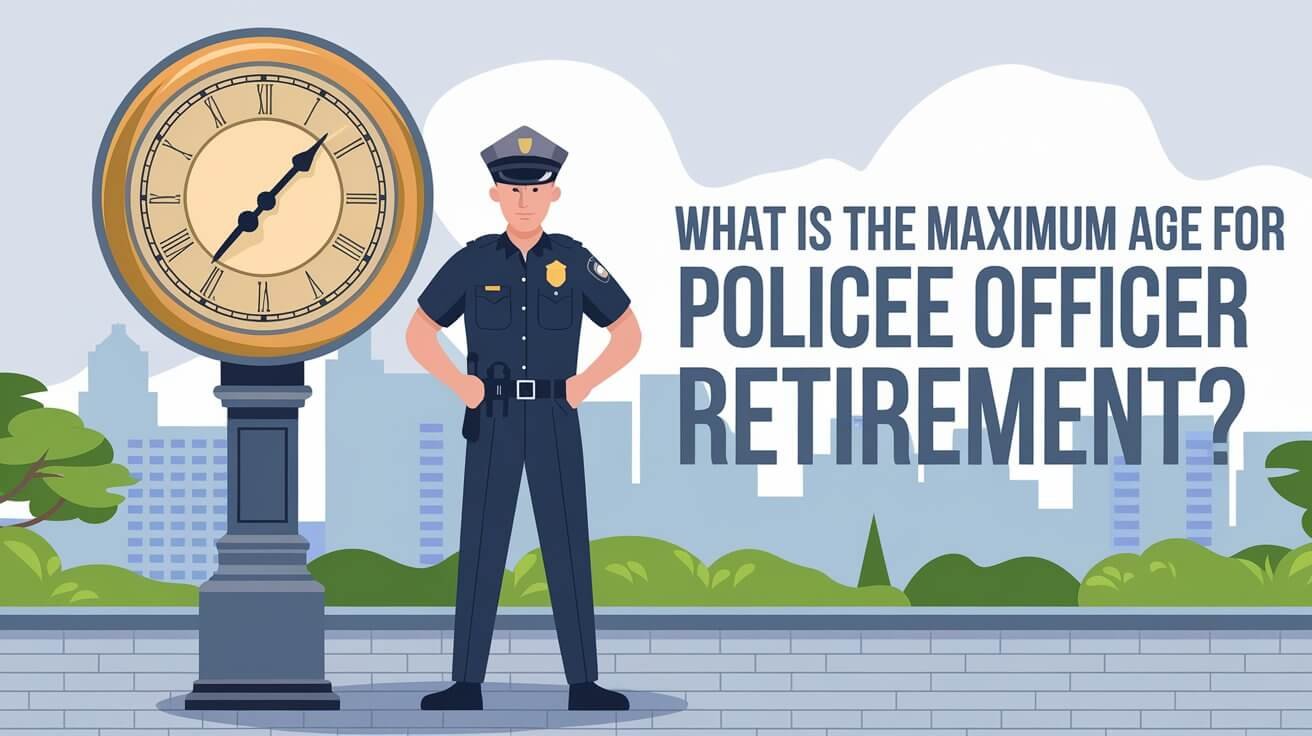What Is The Maximum Age Police Officer Retirement?

Police officer retirement is a big deal in law enforcement careers. The maximum age limit changes based on the state and retirement system. Knowing the maximum age limit is key to when officers can retire and get their full benefits.
Officers can retire after a set number of years or at a certain age. The full pension for Law Enforcement Officers (LEOs) in the Local Governmental Employees’ Retirement System (LGERS) is 1.85 percent times their service and compensation. The “25-Year LEO Retirement Option” law also plays a role, allowing early retirement with a reduced benefit after 25 years of service. This makes it important to think about the maximum age limit when planning for retirement.
Police Officer Retirement Age Requirements
Police officers have different retirement ages based on federal laws, state rules, and special cases. Federal laws set a minimum age for retirement. States may offer more benefits or have their own rules.
It’s important for police officers to know these rules when planning their retirement. For example, Purdue University’s plan for police and firefighters aims for retirement at 55 with 20 years of service. A member can get normal retirement benefits after 20 years and turning 55.
Federal Law Standards
Federal law says police officers must retire at 57 after 20 years. Agency leaders can let officers stay until 60 if it’s in the public interest.
State-Specific Regulations
States have their own rules for police retirement. Officers can get full benefits after 20 years or at 55 with 10 years. Their retirement pay is 3.5% of their highest three years’ earnings times their years of service, up to 84%.
Special Circumstances Exceptions
There are special cases for retirement, like disability or early retirement due to injury. For service-related disabilities, officers get 75% of their average earnings. For non-service disabilities, it’s like a 10-year service member’s benefit.
| Retirement Plan | Eligibility | Benefits |
|---|---|---|
| Purdue University | 20 years of service and age 55 | 74% of base salary |
| Police Officer | 20 years of continuous service or age 55 with 10 years of service | 3.5% of average monthly earnings multiplied by years of service, capped at 84% |
Mandatory Retirement Policies Across States
Mandatory retirement rules for police officers differ by state. Some states require retirement at a certain age, while others don’t. The age can be between 55 and 65, depending on the state and retirement system. For example, the US Capitol Police (USCP) must retire at 57, but has made exceptions three times.
Police officers need to know their state’s retirement rules to plan well. Some states have a set retirement age, while others don’t. It’s important for them to understand their state’s policies to make good career and retirement choices.
Here are some key points to consider about mandatory retirement policies: * The mandatory retirement age can range from 55 to 65, depending on the state and the type of retirement system. * Some states have a mandatory retirement age, while others do not. * Police officers should be aware of the mandatory retirement policies in their state to plan their retirement according. * The USCP has a mandatory retirement age of 57, but has allowed temporary blanket waivers on three occasions.
| State | Mandatory Retirement Age |
|---|---|
| US Capitol Police | 57 |
| Other States | 55-65 |
Knowing about mandatory retirement policies is key for police officers to plan their careers and retirements. By understanding their state’s rules, they can make smart choices for their future. This ensures a smooth transition into retirement.
Physical Fitness Standards and Age Limits
Being physically fit is key for police officers. They must meet certain standards to retire well. Age also affects when they can retire. Studies show that as officers get older, the fitness standards get tougher.
Several factors influence these standards and age limits. These include annual checks, medical tests, and fitness programs. For example, officers must be at least 20.5 years old to apply. They also need a valid driver’s license with no recent traffic violations.
Annual Assessment Requirements
Annual tests are vital to check an officer’s fitness. These tests include the Gerkin treadmill test and the YMCA bench press test. They help decide if an officer can retire.
Medical Evaluation Criteria
Medical checks are also important. They look at BMI, body fat, and vertical jump. Research shows that many officers have higher body fat and BMI than recommended.
Fitness Maintenance Programs
Fitness programs help officers stay fit. These include workouts, training, and healthy eating tips. Staying fit is important for a successful retirement.
| Age Group | Physical Fitness Standard | Assessment Requirement |
|---|---|---|
| 20-30 years | High level of cardiovascular fitness | Gerkin treadmill test |
| 30-40 years | Moderate level of muscular fitness | YMCA bench press test |
| 40-50 years | Low level of body fat percentage | Medical evaluation criteria |
Pension Benefits and Age Considerations
Planning for police officer retirement involves looking at pension benefits and age. The age at which a police officer retires affects their pension. For example, in California, the formula for retirement benefits is 3% at 50 or 2.7% at 57. This depends on age and years of service.
To get the most from pension benefits, police officers should think about their age and years of service. In most states, officers need to be 55 or older and have 20 years of service to get benefits. Also, their retirement benefits are usually 50% of their salary at retirement. Important factors to keep in mind include:
- Maximum contribution limits for 401(k) and 457(b) plans: $22,500 in 2023 and $23,000 in 2024, with an additional catch-up contribution of $7,500 for those over 50.
- Employer matches for retirement plans can cover up to a certain percentage of an employee’s salary, such as 5%.
- Longevity risk is a significant concern, requiring retirement funds to potentially support retirement for 30 years or more.
Getting advice from a financial advisor who knows about law enforcement retirement can be very helpful. They can guide on pension plans, healthcare, and the unique challenges faced by law enforcement. By planning well, police officers can look forward to a secure and comfortable retirement, considering their pension and age.
| Retirement Plan | 2023 Contribution Limit | 2024 Contribution Limit |
|---|---|---|
| 401(k) and 457(b) | $22,500 | $23,000 |
| IRA | $6,500 | $7,000 |
Early Retirement Options for Law Enforcement
Law enforcement officers have many early retirement options. These include voluntary retirement programs. These programs let officers retire early with a smaller benefit after a certain number of years of service. For instance, the “25-Year LEO Retirement Option” allows officers to retire early after 25 years of service.
These early retirement options give law enforcement officers more flexibility in planning their retirement. Officers should think carefully about these options to find the best fit for them. Important things to consider include how long they’ve served and how it might affect their retirement benefits. Here are some key points to keep in mind:
- Voluntary retirement programs offer a reduced benefit at any age after a certain number of years of creditable service.
- Service length requirements vary depending on the specific program and the officer’s individual circumstances.
- Early retirement options can provide a range of benefits, including increased flexibility and potentially saving money.
Law enforcement officers may also be eligible for other retirement benefits, like disability retirement or phased retirement. These options have different rules and benefits. Officers should look at all their options to choose the best one for their situation.
| Retirement Option | Service Length Requirement | Age Requirement |
|---|---|---|
| Voluntary Retirement | 25 years | Any age |
| Disability Retirement | Varies | Varies |
| Phased Retirement | 20 years | 50 or older |
Health Insurance and Retirement Benefits
Police officers should think about their health insurance when planning for retirement. It’s key to know about Medicare integration. This ensures a smooth move into retirement. Health insurance is a big part of retirement benefits, and officers need to know their options.
Retirement benefits, like health insurance, aim to keep officers financially secure and worry-free after they retire. Medicare integration is vital. It helps officers deal with the healthcare system and get the care they need.
Some important things about health insurance and retirement benefits for police officers include:
- Coverage options after retirement, such as Medicare and supplemental insurance plans
- Medicare integration and how it affects retirement benefits
- Health insurance options for police officers, including group plans and individual policies
| Retirement Benefit | Description |
|---|---|
| Health Insurance | Coverage options for police officers after retirement |
| Medicare Integration | How Medicare affects retirement benefits for police officers |
| Supplemental Insurance | Additional coverage options for police officers in retirement |
Coverage Options After Retirement
Police officers have many coverage options after they retire. These include Medicare and supplemental insurance plans. These can help fill gaps in coverage and ensure they get the care they need.
Medicare Integration
Medicare integration is a big deal for police officers’ health insurance. Officers should know how Medicare impacts their retirement benefits. By combining Medicare with their current insurance, officers can smoothly transition into retirement and get quality healthcare.
Career Transition Opportunities
As police officers near retirement, they often look for new career paths. This change can be big, but finding a new job can bring joy and purpose. Many use their skills to move into roles like corporate security managers, cybersecurity specialists, or intelligence analysts.
Some popular career paths for police officers include:
- Corporate security manager: $100K median salary
- Cybersecurity specialist: $103K median salary
- Intelligence analyst: $84K median salary
- Forensic accountant: $77K median salary
These jobs use the skills and experience gained in law enforcement. This helps officers feel connected and fulfilled. By exploring new career options, they can look forward to their retirement with hope and excitement.
| Career Path | Median Salary |
|---|---|
| Corporate Security Manager | $100K |
| Cybersecurity Specialist | $103K |
| Intelligence Analyst | $84K |
| Forensic Accountant | $77K |
Financial Planning for Police Retirement
Financial planning is key for a good police retirement. It ensures a secure and comfortable life after service. Warren Buffet said, “Risk comes from not knowing what you’re doing.” This shows the need for smart investment choices.
Setting SMART goals for retirement is important. This means having a clear plan for your investments. It’s also vital to know how taxes affect your retirement savings.
Police officers should know about investment strategies. They should avoid market timing mistakes. There are two main ways to withdraw from retirement savings. Also, required minimum distributions (RMDs) after age 72 are important to consider. A good financial plan helps ensure a secure retirement.
| Retirement Benefit | Description |
|---|---|
| Final Average Salary | Comprised of pensionable earnings, excluding overtime but including variable shift assignment pay, certification pay, and longevity in rank pay |
| Multiplier | 2.5% per year of creditable service, limited to 90% for firefighters hired on or after March 1, 1989, and police officers hired on or after July 1, 1989 |
| Maximum Annual Benefit | Calculated by multiplying the final average salary by the multiplier |
Final Thoughts
The maximum age for police officer retirement changes by state and retirement system. Mandatory retirement and physical standards are key. Yet, officers must also think about their pension, health insurance, and financial plans for a secure retirement.
Understanding retirement options helps police officers make smart choices. They can use early retirement programs and maximize their pensions. This way, law enforcement workers can smoothly move into retirement with peace of mind.
A successful police officer retirement needs a balanced approach. It must meet the job’s needs and the officer’s goals. By staying informed and using available resources, law enforcement officers can look forward to a rewarding retirement.
Frequent Questions
What is the maximum age limit for police officer retirement?
The age limit for police retirement varies by state and retirement system. Officers can retire after a set number of years or at a certain age. The “25-Year LEO Retirement Option” allows for retirement at any age after 25 years of service.
What are the federal law standards, state-specific regulations, and special circumstances exceptions for police officer retirement age requirements?
Federal law sets a minimum retirement age. States may offer extra benefits or have their own rules. Special cases, like disability or injury, can also affect retirement age.
How do mandatory retirement policies vary across states for police officers?
States have different rules for police retirement. Some have a mandatory age, while others don’t. The age can range from 55 to 65, depending on the state.
What are the physical fitness standards and age limits for police officers?
Police officers must stay physically fit to work. As they age, this gets harder. They need regular checks and fitness programs to keep up.
How do pension benefits and age considerations impact police officer retirement planning?
Pension benefits and age are key in planning retirement. The retirement age affects how much pension an officer gets.
What are the early retirement options for law enforcement officers?
Law enforcement has early retirement options. These include voluntary programs and service requirements. They offer flexibility in retirement planning.
What health insurance and retirement benefits are available to police officers after retirement?
Health insurance and retirement benefits are important after retirement. Officers should look into their health insurance options, including Medicare.
What career transition opportunities are available for retiring police officers?
Retiring officers have many career options. These can give them a new purpose and income.
How should police officers plan their financial future for retirement?
Planning for retirement is key for a secure future. Officers should look into investments and social security benefits.






